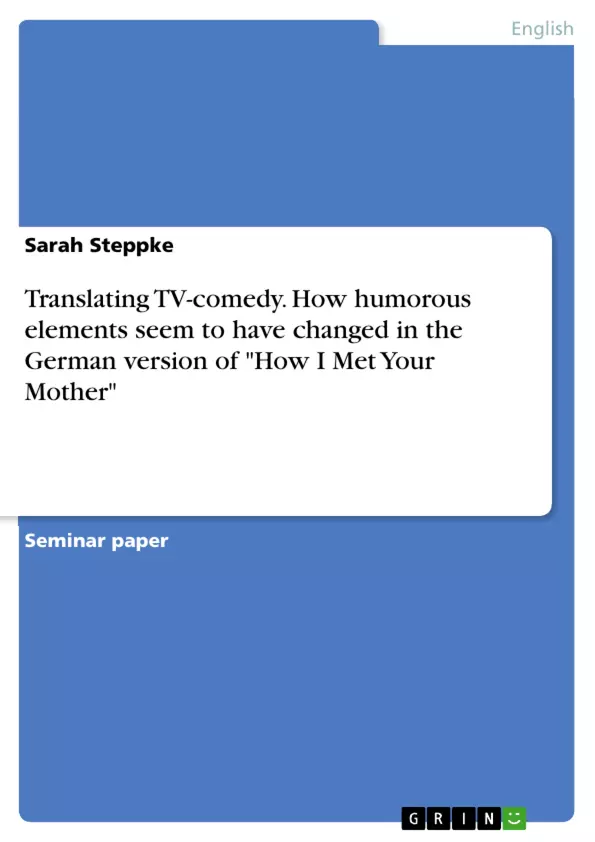This paper deals with the errors in translating TV-Comedy, which lead to humorous effects being lost. A case study of the series "How I met your mother" exemplifies such losses.
I picked "How I Met Your Mother" due to its incredible amount of funny aspects and the great diversity thereof, which opens up the content of the show to a wide range of viewers.
In this paper, humor shall be looked at from the angle of translation. In order to demonstrate that certain humorous elements are being changed while translating, I observed the comedy series "How I Met Your Mother" in English as well as in German. With the help of former scholarly works, I tried to establish a pattern of categories for the very complex aspect of humor and will try to connect these categories to the variables they are depending on.
Since this paper deals with the translation of humor I researched the interrelation of both, which is not fully elaborated yet and bares lots of difficulties. By looking at the differences between the original and the translated versions of "How I Met Your Mother", I will try to demonstrate the above mentioned difficulties of translating humor and show how these
problems affect the perception of the TV show in the target language when it comes to funniness.
Inhaltsverzeichnis (Table of Contents)
- Introduction
- 1. Aspects of humor
- 2. Aspects of translation
- 3. Problems of translation
- 3.1 Problems of translating humor
- 3.1.1 Linguistic problems of translating humor
- 3.1.1.1 Ambiguity
- 3.1.1.2 More semantic aspects
- 3.1.1.3 Rhetorical devices
- 3.1.1.4 A pragmatic occurrence
- 3.1.1.5 A phonological occurrence
- 3.1.1 Linguistic problems of translating humor
- 3.1 Problems of translating humor
- Conclusion
Zielsetzung und Themenschwerpunkte (Objectives and Key Themes)
This paper examines the effects of translating TV comedy, specifically analyzing how humorous elements change in the German edition of “How I Met Your Mother.” The objective is to demonstrate the challenges of translating humor and how these problems affect the perception of the show in the target language.
- The difficulties of translating humor.
- The importance of linguistic and cultural context in humor.
- The role of pragmatics in translation.
- The impact of translation on the humor of "How I Met Your Mother" in German.
- The potential for loss or alteration of humor in translation.
Zusammenfassung der Kapitel (Chapter Summaries)
- Introduction: This section introduces the concept of humor and its universality, emphasizing that humor is highly individual and can't be attributed to entire cultures or groups. It highlights the focus of the paper on humor in translation, using “How I Met Your Mother” as a case study.
- 1. Aspects of Humor: This chapter explores the difficulty of defining humor and presents various attempts to establish a universal definition. It introduces Jakobson's modes of speech and highlights the diverse disciplines involved in the study of humor, emphasizing its individualistic nature.
- 2. Aspects of Translation: This chapter discusses the differences between the English and German versions of "How I Met Your Mother," noting the changes in humor due to the translation process. It defines translation as a mediation between two code systems and highlights the inherent challenges involved in translating humor.
- 3. Problems of Translation: This chapter delves into the various problems encountered in translation, particularly on the linguistic level. It discusses Jakobson's concept of semiotic facts and the lack of complete equivalence between signs in different languages. It provides an example of the linguistic differences between English and German, demonstrating the difficulty of achieving perfect homology.
Schlüsselwörter (Keywords)
This research focuses on the translation of humor, examining the challenges and effects of translating TV comedy. The key concepts explored include linguistic differences, cultural context, pragmatics, humor theories, and the impact of translation on the perception of humor. The study draws upon the specific example of "How I Met Your Mother" to illustrate these concepts.
Frequently Asked Questions
What is the primary objective of this study on "How I Met Your Mother"?
The study examines how humorous elements change or are lost when translating the TV comedy "How I Met Your Mother" from English into German.
Why was "How I Met Your Mother" chosen for this translation analysis?
It was selected due to its high density and diversity of humorous aspects, which makes it an ideal case study for observing translation difficulties.
What are the main linguistic problems identified in translating humor?
Key problems include ambiguity, semantic differences, rhetorical devices, and pragmatic or phonological occurrences that do not have direct equivalents in the target language.
How does the paper define translation in this context?
Translation is defined as a mediation between two code systems, which inherently involves challenges when trying to achieve "perfect homology" between languages like English and German.
Does humor translate universally across cultures?
The paper argues that humor is highly individual and cannot be easily attributed to entire cultures or groups, making its translation particularly complex.
What role does context play in the translation of comedy?
Linguistic and cultural context are crucial; without them, the intended humorous effect is often lost or significantly altered for the target audience.
- Arbeit zitieren
- Sarah Steppke (Autor:in), 2014, Translating TV-comedy. How humorous elements seem to have changed in the German version of "How I Met Your Mother", München, GRIN Verlag, https://www.grin.com/document/340219



